
-
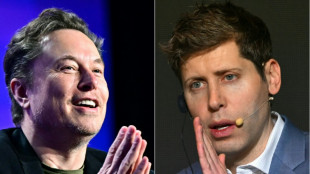 AI feud: How Musk and Altman's partnership turned toxic
AI feud: How Musk and Altman's partnership turned toxic
-
US inflation fight to take time in 'highly uncertain' environment: Fed official

-
 Ford CEO says Trump policy uncertainty creating chaos
Ford CEO says Trump policy uncertainty creating chaos
-
Dam fine: beavers save Czech treasury $1 million

-
 Altman says OpenAI 'not for sale' after Musk's $97 bn bid
Altman says OpenAI 'not for sale' after Musk's $97 bn bid
-
Trump says US disaster relief agency should be 'terminated'

-
 'Ridiculous and lame': South Africans mock Trump proposals
'Ridiculous and lame': South Africans mock Trump proposals
-
JD Vance puts Europe, China on notice at AI summit
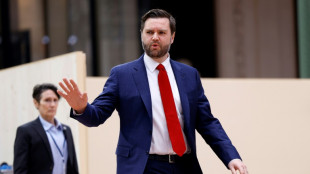
-
 Global stocks mixed as tariff uncertainty looms
Global stocks mixed as tariff uncertainty looms
-
BP pledges strategic 'reset' as profit tumbles

-
 Gucci owner Kering's annual profit plunges
Gucci owner Kering's annual profit plunges
-
Trump signs orders for steel, aluminum tariffs to start March 12

-
 EU leaders vow 'firm' response to US tariffs
EU leaders vow 'firm' response to US tariffs
-
New Zealand rethinks opposition to deep-sea mining

-
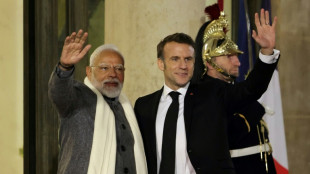 World leaders seek elusive AI common ground at Paris summit
World leaders seek elusive AI common ground at Paris summit
-
YouTube, the online video powerhouse, turns 20

-
 Playgrounds come alive again with Brazil school phone ban
Playgrounds come alive again with Brazil school phone ban
-
Could a climate megaproject cloud Chile's unparalleled views of universe?

-
 Trump signs executive orders on steel, aluminum tariffs
Trump signs executive orders on steel, aluminum tariffs
-
US judges challenge Trump cuts as legal battles mount

-
 Global stock markets brush off latest Trump tariffs
Global stock markets brush off latest Trump tariffs
-
Macron vows at summit France to 'deliver' on AI acceleration
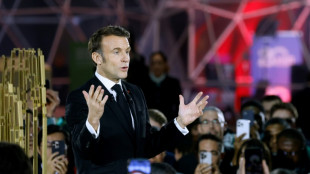
-
 Steel at heart of new Trump trade war
Steel at heart of new Trump trade war
-
US federal workers weigh Trump buyout as court to step in

-
 McDonald's profits dented by food poisoning outbreak
McDonald's profits dented by food poisoning outbreak
-
Almost half of remote French island hit by wildfire: official
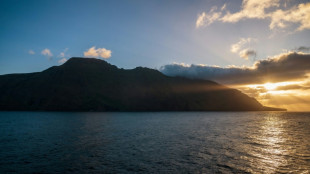
-
 Trump to impose new 25% tariffs on steel, aluminum
Trump to impose new 25% tariffs on steel, aluminum
-
Global stocks markets push higher despite more Trump tariffs

-
 Nestle share slump adds pressure on new boss
Nestle share slump adds pressure on new boss
-
Spain boss Tome denies 'punishing' Hermoso after forced kiss

-
 Global stocks rise despite more Trump tariffs
Global stocks rise despite more Trump tariffs
-
Nokia names Intel's AI head to replace CEO

-
 Trump to impose new 25% tariff on US steel, aluminum imports
Trump to impose new 25% tariff on US steel, aluminum imports
-
Nokia CEO Lundmark to be replaced by Intel AI chief Hotard

-
 Almost all nations miss UN deadline for new climate targets
Almost all nations miss UN deadline for new climate targets
-
Most Asian markets drop as traders weigh Trump's latest tariff salvo

-
 Afghan wedding halls light up sombre Kabul nights
Afghan wedding halls light up sombre Kabul nights
-
Government chiefs and tech leaders gather in Paris for AI summit
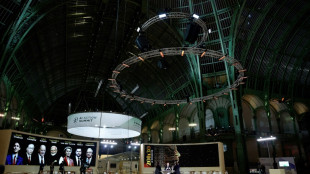
-
 Trump says will impose 25% tariffs on US steel, aluminum imports
Trump says will impose 25% tariffs on US steel, aluminum imports
-
Trump says Musk will help uncover 'hundreds of billions' in US govt fraud

-
 Baltic nations 'successfully' link with European power grid
Baltic nations 'successfully' link with European power grid
-
Iranian schools and offices shut as cold snap bites

-
 AI app offers a lifeline for S.Africa's abused women
AI app offers a lifeline for S.Africa's abused women
-
China inflation picks up after Lunar New Year spending boost

-
 Record gold prices both boon and burden for London jewellers
Record gold prices both boon and burden for London jewellers
-
Musk risks putting EU buyers off Tesla: analysts

-
 Soaring egg prices have US consumers squawking
Soaring egg prices have US consumers squawking
-
Richard Gere calls Trump a 'bully' at Spain's top film awards
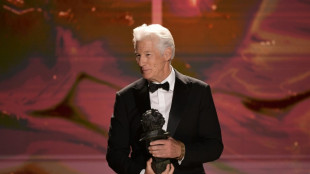
-
 Elon Musk says has no plans to acquire TikTok's US operations
Elon Musk says has no plans to acquire TikTok's US operations
-
Baltics disconnect from Russian power grid without incident


Baltics disconnect from Russian power grid without incident
The three Baltic states on Saturday seamlessly cut ties with Russia's power grid to integrate with the European Union's network, a switch that gained urgency with Moscow's invasion of Ukraine.
Estonia, Latvia and Lithuania -- small EU and NATO members once part of the Soviet Union -- had planned the change for years but sped up the process after Russia's full-scale Ukraine invasion.
The war launched in February 2022 triggered fear in the Baltics that they could be targeted next. The staunch Ukraine supporters also worried that Russia would blackmail them using the electricity system.
"We are safe because we have disconnected from the Russian grid," Nerijus Cesiulis, mayor of the southern Lithuanian city of Alytus, told AFP.
He added it was important to avoid a repeat of incidents "like those in the Baltic Sea", where several undersea telecom and power cables have been severed in recent months.
Some experts and politicians have accused Russia of waging a "hybrid war", including unconventional targeting of energy supplies, an allegation Moscow denies.
Authorities had warned of the potential for sabotage or other disruptions linked to the grid switch, but the disconnection went off without a hitch.
Baltic grid operators said Russia had cooperated during the disconnection process.
The European Commissioner for Energy, Dan Jorgensen, said it was "a historic day".
"I like the light better when there's no Russian electrons involved," he told reporters in Estonian capital Tallinn.
"This is about security... No European country should be dependent on Russia for anything," he added.
Ukrainian Energy Minister German Galushchenko also hailed the disconnection as a "significant event for the whole of Europe".
"Such steps deprive the aggressor of the opportunity to use the electricity sector for blackmail and political games," he said Saturday.
- Mostly EU-funded -
After the Baltic states completed the disconnection process on Saturday morning, Latvia physically cut a power line to Russia.
"Now we have complete control over our power grid," Latvian Energy Minister Kaspars Melnis told reporters while holding a piece of dismantled wire.
His Lithuanian counterpart Zygimantas Vaiciunas told AFP they had eliminated any potential for Russia to use grid control "as a weapon".
Vaiciunas said the Baltics were now operating in so-called "isolated mode" before they integrate with the European grid via Poland on Sunday.
The window of time was so they could run tests to assure Europe their energy system was stable, Lithuanian state-run grid operator Litgrid said.
It added on Saturday evening it had completed all "frequency control tests" and everything was progressing as planned.
A total of 1.6 billion euros ($1.7 billion) -- mostly EU funds -- have been invested in the synchronisation project across the Baltic states and Poland.
European Commission chief Ursula von der Leyen was to attend a ceremony with Baltic leaders in Vilnius on Sunday.
- 'Symbolic' -
Lithuanian engineer Aras Valiukas, 45, was happy about the grid switch, calling it "symbolic".
"We have disconnected from the Soviet Union," he told AFP in downtown Vilnius.
The Baltics have long prepared to integrate with the European grid but faced technological and financial issues.
They stopped purchasing Russian gas and electricity after the invasion but their power grids remained connected to Russia and Belarus, controlled from Moscow.
This left them dependent on Moscow for a stable electricity flow, which is crucial for factories and facilities requiring a reliable power supply.
Litgrid and Latvian grid operator AST said Russia had cooperated with Saturday's switch.
"They disconnected power to the same line also from their side, with the biggest surprise today being that there are no surprises," AST CEO Rolands Irklis told AFP.
Litgrid head Rokas Masiulis said that "when you are part of the same (electricity) system, you cannot harm the other without harming yourself".
Masiulis said Russia had to ensure the energy security of the Russian exclave of Kaliningrad, "which was in part dependent on us".
The exclave is located between Lithuania and Poland and has no border with the rest of Russia.
Because of the Baltic decoupling, the energy system in Kaliningrad will no longer have grid connection to mainland Russia.
Kaliningrad has been building up its power generation capacity for years and Kremlin spokesman Dmitry Peskov dismissed all concerns.
Asked about the cut-off last week, he said: "We have taken all measures to ensure the uninterrupted reliable operation of our unified energy system."
L.K.Baumgartner--CPN
